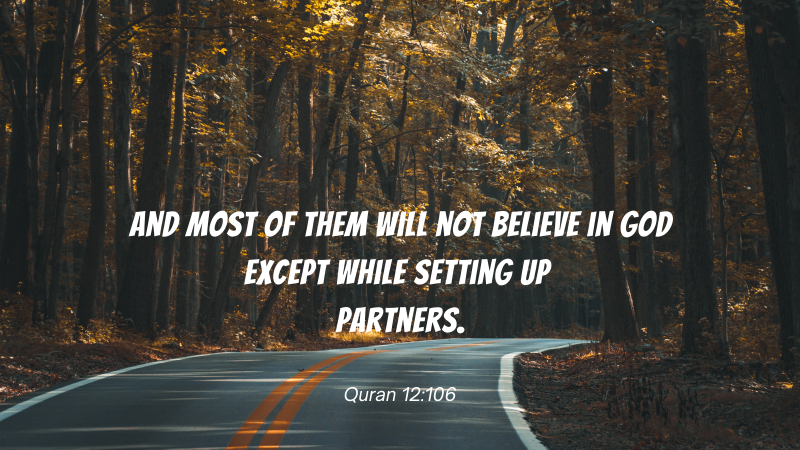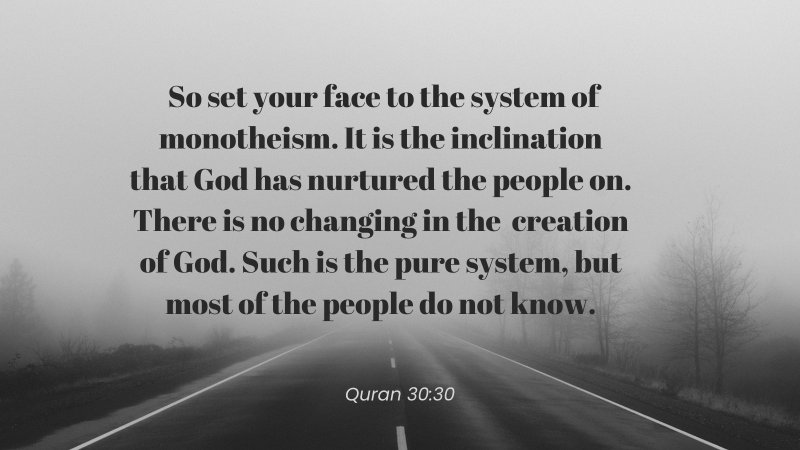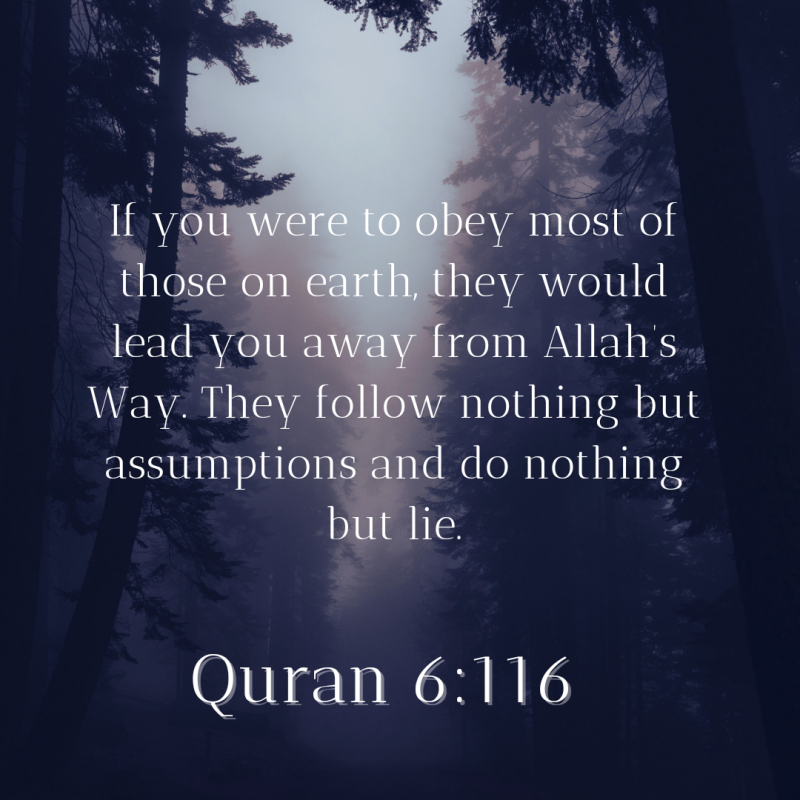Most of the People: A Divine Revelation of Human Nature
",but most people do not know". [Quran 12:40]
When God repeats Himself, listen closely
In a Book where every word is deliberate, repetition is never random. The phrase “most of the people” (أَكْثَرَ ٱلنَّاسِ) appears 20 times throughout the Quran — almost always paired with warnings, disappointment, or divine judgment.
We are told again and again:
- Most people do not believe — Quran 11:17
- Most people are ungrateful — Quran 2:243
- Most people do not reason — Quran 29:63
- Most people follow nothing but conjecture — Quran 10:36
Why does the All-Wise, All-Knowing repeat this? Not to shame us — but to wake us up.
This is not just about “them.”
It’s about us.
It is a divine diagnosis of human nature.
If most people go astray, what does that mean for you?
It means:
If you live your life on default, if you follow what’s around you, what’s inherited, what’s common — you will not find the truth.

The pattern of blind following: From the past to today
The Quran contains real stories. Not fairy tales. But real, aching lives.
And over and over, those who were right — stood alone.
1. Nuh
Nuh spent years warning his people. He called his people day and night. He pleaded. He warned. Yet, how many listened?
“None had believed with him, except a few.” (Quran 11:40)
The majority dismissed him, mocked him, and clung to their inherited beliefs. But when the flood came, their numbers meant nothing.
If you lived in Nuh’s time, would you have followed him? Or would you have stayed with the crowd?
2. Ibrahim
Ibrahim was raised in a society where idol worship was the norm. He dared to question it:
“What you serve besides Him are nothing except names which you have created, both you and your fathers, God has not sent down any authority for such. The judgment is for none except God. He has ordered that none be served except He. That is the true system, but most of the people do not know.” (Quran 12:40)
He stood alone, smashing idols and challenging the status quo. His people were outraged. Not because they had proof Ibrahim was wrong, but because he dared to question tradition.
Does this sound familiar?
Today, how many Muslims follow traditions they cannot explain?
How many simply accept religious rulings because "a scholar said so"?
How many trust cultural practices because "this is how our forefathers did it"?
What’s the difference between idol worship and blind obedience?
3. Lut
The people of Lut were morally corrupt and deeply entrenched in sin. He was sent as a warner, but his message was met with hostility, mockery, and denial.
How many actually believed in him?
But We only found in it one house of those who had submitted. (Quran 51:36)
Just one household. Out of an entire city. The Quran shows us that even Lut’s own wife was among those destroyed:
We saved him and his family, except for his wife; she was of those who were destroyed. (Quran 7:83)
The lesson is severe and clear:
You could be surrounded by thousands, but if they are all rejecting guidance, your safety is in standing apart.
Even being closely related to a messenger doesn't save you if you're part of the conformist majority.
4. And Now — It’s Our Turn
The Quran is not just history. It is diagnosis.
Everything is repeating.
People worship power, wealth, identity — and call it progress.
Communities inherit religion, but forget revelation.
The Quran is decorated, recited, kissed — but not followed.
The past is present. The idols have changed shape, but the hearts remain the same.
And once again, most of the people are turning away.

Religion by Inheritance: The Quiet Disaster
"Most of them follow nothing but assumptions." — Quran 10:36
How many people say they believe — but never truly searched?
They were born into a religion.
They followed the scholars.
They memorized the rules.
They repeated the formulas.
But did they ever ask:
“Did God actually say this?”
“Is this in the Quran?”
“Am I obeying God — or someone speaking about Him?”
They don’t know what’s in the Book.
They think they do — but they don’t.
And so their entire religion becomes a shell — with no substance, no surrender, and no soul.

The Forgotten Quran
“And the Messenger will say: My people have abandoned this Quran.” — Quran 25:30
We print it. We decorate walls with it. We recite it beautifully. But when it speaks, we don’t listen.
The Quran describes itself as:
- Complete (6:38)
- Fully detailed (6:114)
- Guidance (16:89)
- Explained in various ways (17:41)
And yet most people say: It’s not enough.
They turn to books, scholars, hadith collections, sects, schools of thought — seeking what God already gave them, but they’ve never read with open eyes.
“Is it not sufficient for them that We have sent down to you the Book?” — Quran 29:51
The Quran doesn’t ask you to believe because someone told you to.
It demands you to read, reflect, and respond — yourself.
What “Most People” fail to do — and what you must not
“Most of the people, even if you strive eagerly, will not believe.” — Quran 12:103
The Quran reveals not just what people do — but what they fail to do.
They don’t know — because they don’t ask.
They assume knowing about religion is the same as knowing God’s words. They listen to sermons but never open the Book themselves.
They don’t believe — not with heart, only with habit.
Their faith is cultural, not conscious. Words on the tongue, not light in the chest.
They don’t understand — because they delegate thinking to others.
They believe what others say about God, instead of hearing from God Himself.
“Will they not reflect upon the Quran, or are there locks upon their hearts?” — Quran 47:24
They’re not grateful — because they want more than what God gave.
God says His Book is complete. They say it needs supplements.
“And few of My servants are truly grateful.” — Quran 34:13
The courage to be alone
Truth will rarely be trending.
It’s not always found in the mosque, the pulpit, or the crowd. Sometimes, it’s found in your room — when you open the Quran with an honest heart, and ask your Creator directly.
This is the path of solitude, but not isolation.
You may be rejected.
You may be mocked.
You may even be afraid.
But you will never be alone — if God is enough for you.
“And whoever puts their trust in Allah, then He ˹alone˺ is sufficient for them” — Quran 65:3
Let the world go its way.
Let most of the people chase illusion.
You — turn to the Quran.
Turn to the One who made you.
Turn to the truth that requires no intermediaries.
“Indeed, your Lord knows best who has strayed from His path, and He knows best who is guided.” — Quran 6:117
The Quran doesn’t just describe reality.
It divides it.
It separates those who think from those who follow.
Those who believe with knowledge from those who inherit belief without question.
Those who take the Quran as sufficient — and those who don’t.
“This is a clear message for all people — so that they may be warned, and so that they may know He is One God, and so that those of reason may take heed.” — Quran 14:52
The Quran speaks directly to you:
- Will you repeat the pattern of “most of the people”?
- Or will you break it?
- Will you submit to inherited religion?
- Or will you surrender to God's clear words?
The Quran doesn’t beg to be believed. It challenges.
It’s not looking for followers. It’s looking for sincerity.
Most people will ignore it.
Will you?

Your next Step:
- Don't just believe what you read here😉.
- Go to the Quran.
- Open it.
- Read slowly.
- Question everything — and ask your Creator directly. He answers...
“When My servants ask you about Me — I am near. I answer the call of the caller when they call upon Me.” — Quran 2:186